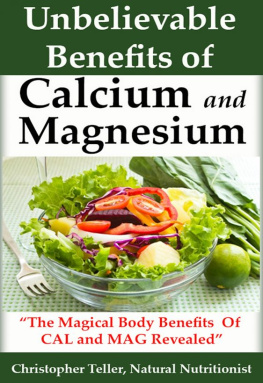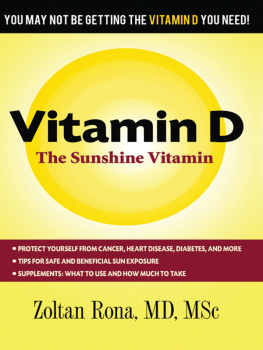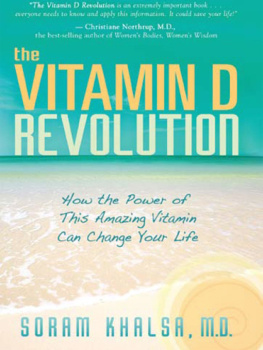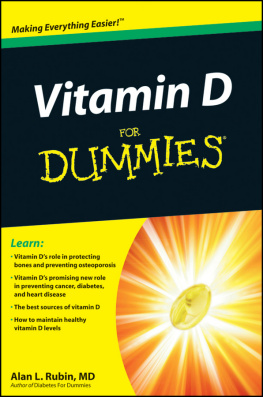Vitamin K2 and the Calcium Paradox
How a Little-Known Vitamin Could Save Your Life
Kate Rhaume-Bleue
Contents
To Sterling, I hope by the time you are grown up,
this will all be common knowledge.
Acknowledgments
First of all I'd like to thank my amazing literary agent, Rick Broadhead. Rick immediately recognized the value of my idea, helped me shape the proposal, found a home for my book at Wiley and supported me in every step of the publishing and marketing process. Thanks, Rick.
Thank you to my family for their support and patience throughout the writing process and beyond. I'm especially grateful to my husband, Chris, for his encouragement and analogies, and to my in-laws, Linda and David, for frequent babysitting and dog walking. To my own Mum and Dad, thanks for instilling in me a sense of curiosity, an appreciation of language and determination. Also to my sister, Robin, thanks for being in my corner.
Thank you to my many dear friends who supported me along the waywhether you knew it or not. I'm particularly appreciative of you, Rahima, Paula, Jenny, Cher, Lynn, Lara, Lisa and Joyce.
Just in case I don't get a chance to say it elsewhere, I'm deeply appreciative of every member of my Factors Familyyou know who you arefor support and inspiration. I'm especially thankful to Joanne Aldridge. Jo, thanks for keeping me organized, putting out fires and making things happen.
I'd like to gratefully acknowledge cardiologist and author Dr. William Davis, who generously contributed the case study featured in Chapter 6. Thanks, Bill.
It's been a real pleasure and honor working with every member of the team at John Wiley & Sons, Canada. I feel like my book and I belong here, and I'm thankful for that.
Finally, I'd like to express my humble gratitude to the many brilliant researchers and true scientific experts whose names appear in the endnotes of this book. This book would not have been written without your efforts and I hope it does justice to your work.
Chapter 1
The Calcium Paradox
In April of 2011, nutrition researchers shocked the medical community when they publishedin the prestigious British Medical Journal no lessthe results of yet another calcium and heart health study. According to the study, women who supplement with calcium to prevent osteoporosis are at a higher risk of atherosclerosis (formation of calcium plaques in the arteries), heart attack and stroke than those who don't. The outcome was clear: the increased risk of death from heart disease associated with calcium supplements outweighed any benefit to bone health. Based on this research, for every bone fracture calcium supplementation prevents, it precipitates two potentially fatal cardiovascular disease events.
This was not the first analysis to report this staggering finding; it was the third trial to confirm the trend. Confusion quickly set in among the millions of health-conscious consumers who heard the newsand among the health care providers who recommend calcium supplements. If we don't take calcium, aren't we doomed to crumbling, fractured bones from osteoporosis? If we do take calcium, are we doomed to suffer hardening of the arteries and death from cardiovascular disease? Is calcium killing us? The implications were so staggering and baffling that the studies were largely swept under the rug, so don't be surprised if you didn't hear about it at first.
Exactly how did the studies' authors arrive at their unsettling conclusion, and what does it really mean? According to this research, if 1,000 women take calcium supplements for five years, at the end of that period there will be three fewer bone fractures in that group compared to a similar group of women who didn't take calcium supplements. Three fewer fractures doesn't sound very impressive and other studies do report greater fracture-prevention power. However, even if you take these results at face value and multiply those three saved fractures over the millions of women taking calcium supplements, it adds up to a meaningful benefit. Furthermore, it's the best nonprescription bet we've got. As long as there's no overwhelming drawback to popping calcium pills, then everyone should do it. And there's the rub.
The study goes on to say that in the same group of calcium takers over those same five years, there will be six more cardiovascular disease events (heart attack or stroke) than in the nonsupplement group. Six events in 1,000 women also might not sound like major cause for alarm, but it adds up too. More importantly, it's twice the number of fractures prevented, with potentially graver consequences. Curiously, the occurrence of heart attacks is not found to be dose-dependent. In other words, we do not see a greater number of heart attacks in women who take higher doses of calcium, a finding we'll explore later in this chapter. The researchers also note that the ill effect on heart health is not seen with dietary calcium from food. Given these results, the study authors make the staggering declaration that women should abandon calcium supplements.
But what about our bones? Critics of the calcium and heart health studies complain that the research generates more questions than answers. Sometimes groundbreaking research does that, but a more salient criticism is that the studies are raising questions that can't be answered by the research being done. Should we be taking calcium supplements or avoiding them like pleated pants? It turns out that the question Are calcium supplements safe? is the wrong one to ask. Studies looking only at calcium will never adequately answer that questionor they will inaccurately conclude that calcium is harmful. The real question to ask is, How can the body guide calcium safely into the bones where it helps us, and keep it away from soft tissues like arteries where it harms us? The answer is a long misunderstood fat-soluble vitamin called K2.
Why You Need to Read This Book, Whether or Not You Take Calcium Supplements
The calcium questionand its surprising answeris not just for calcium supplement takers, and definitely not just for women. Even if you rely only on food for your calcium intake, heart disease, caused by a deadly accumulation of calcium in arteries, is the number one killer of both women and men in North America. Meanwhile, osteoporosis is a major cause of disability and death in the elderly of both sexes, and calcium and vitamin D supplementation haven't helped prevent it nearly as much as we'd like. This, in a nutshell, is the Calcium Paradox: a mysterious, concurrent calcium deficiency (in the skeleton) and calcium excess (in the arteries) that underlies two major health concerns of our time, osteoporosis and heart disease. Vitamin K2 is the key to putting calcium back in its place to remedy this calcium conundrum. This book will tell you exactly how to do it.
In the face of evidence that calcium is dangerously collecting in blood vessels while our bones are starving for the mineral that is so close by, the advice to just stop taking calcium supplements misses the big picture. Calcium belongs in our bones just as gasoline (environmental objections aside) belongs in the tanks of our cars. You wouldn't go to the gas station and just spray fuel all over your vehicle; you use a nozzle to put the gas where it will do the most good. Vitamin K2 funnels calcium into bones to strengthen mineral density and fight fractures while it prevents and even removes dangerous arterial calcification. Along the way it has beneficial effects for almost every major health concern of our time, including diabetes, cancer, Alzheimer's disease, infertility, tooth decay and growing healthy children. Taking the paradox out of calcium is just the beginning of what vitamin K2 can do for you.






